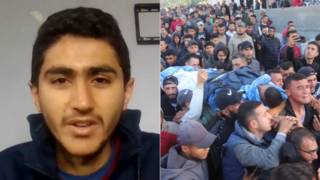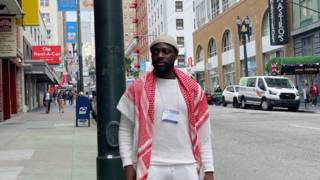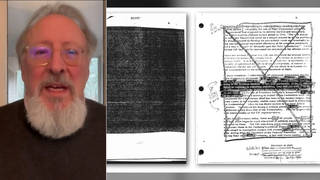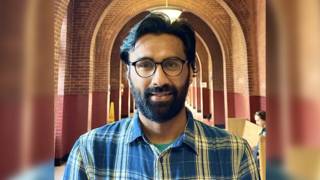
Guests
- Dolores HuertaCivil rights activist and co-founder of the United Farm Workers of America with César Chávez. She is president of the Dolores Huerta Foundation for Community Organizing.
The legendary activist Dolores Huerta, co-founder of the United Farm Workers of America with César Chávez, is celebrating her eightieth birthday this year. A veteran of the labor, civil rights, immigrant rights, and feminist movements in this country, she was instrumental in passing the Seasonal Agricultural Workers Bill, which resulted in the legalization of 1.3 million farm workers. To celebrate her birthday, Huerta is holding a benefit concert in Los Angeles Friday with guests including the guitarist Carlos Santana and Zack de la Rocha of Rage Against the Machine. Calling the event “Weaving Movements Together,” Huerta says she wants to join up immigrant rights, LGBT, feminist, environmental and labor activists. [includes rush transcript]
Transcript
AMY GOODMAN: That’s Carlos Santana performing Tito Puente. Yes, Carlos Santana will be performing this week at the celebration of Dolores Huerta’s eightieth birthday, the legendary activist Dolores Huerta who co-founded the United Farm Workers of America with César Chávez, celebrating eighty years. A veteran of the labor, civil rights, immigrant rights, and feminist movements in the country, Dolores Huerta was instrumental in passing the Seasonal Agricultural Workers Bill, which resulted in the legalization of 1.3 million farm workers as part of the Immigration Reform Act of 1986.
Well, to celebrate her eightieth birthday, this lifelong activist is holding a benefit concert at the Greek Theater in Los Angeles Friday night titled “Weaving Movements Together.” As the name suggests, the event aims to bring together immigrant rights, LGBT, feminist, environmental and labor activists. Dolores Huerta is joining us now from Los Angeles.
We welcome you, and happy birthday, Dolores Huerta.
DOLORES HUERTA: Thank you, Amy.
AMY GOODMAN: Can you talk about what you consider your greatest achievement?
DOLORES HUERTA: Well, I think you mentioned the legalization bill of 1986, which really helped a lot of people get their legal status, as has, as you know, every immigrant that’s come to this country has acquired legal status at one time or the other. Then, of course, I think many, many pieces of legislation, getting the ballots in the Spanish language for people to vote, taking away citizenship requirements so that people could get public assistance, and on and on, you know, forming the Farm Workers union with César Chávez, and now, forming my own organization, the Dolores Huerta Foundation for Community Organizing. And when we look back and see how many people have been organized, how many — you know, building a volunteer base, and laws that have been passed, and — you know, this is the kind of work that I want to continue to do for the rest of whatever life I have left, and this is why I started this foundation.
And I want to mention, this whole idea of bringing movements together is important, because it seems like each one of our movements has a different path. You know, we have our Greens over here, labor over here, the feminists, the LGBT movement. And I believe that in order to really get the progressive agenda that we are all looking for and searching for, that we’ve got to come together and, you know, kind of unite our forces. We are a — you know, we are the majority in this country, but if we don’t come together, well, then we’re not going to be able to win our progressive agenda.
AMY GOODMAN: Dolores Huerta, go back in time. Go back to the early 1960s and talk about how you got involved with the farm workers’ movement and helped found the United Farm Workers. What were the conditions then? Where did you come from?
DOLORES HUERTA: Well, actually, I had a very comfortable life. I have sort of a middle-class background. But after joining an organization called the Community Service Organization — and this is where I met César — then we saw the conditions of the farm workers that were so desperate at that point in time that then that’s when we started the United Farm Workers of America. And, you know, we worked together for many years, until César passed away. I left the union about six years ago. And things for the farm workers, you know, are somewhat better in California, although many — most of the farm workers right now are not covered by union contracts. And in other states, of course, things are even worse, because many farm workers, they don’t have unemployment insurance. They have a very poor workers’ compensation, if they have any at all. And they don’t have disability insurance. We were able to get laws passed that gave all farm workers cold drinking water and toilets in the fields, rest periods, things of that nature. But there’s still a long way to go for the farm workers.
But with my organization, actually, we go into the communities. And we organize our immigrant population, primarily, but this, of course, could apply to anyone. And we basically raise money to hire and train organizers. Then, when the people come together, then they can make a lot of changes. And some of the changes are absolutely miraculous. Some of our people have been able to get swimming pools in their communities. We have one community that actually had a gymnasium built at their middle school. You know, we’ve got another community that’s getting sewer drains for twenty-seven homes that didn’t have any kind of a sewer drain. And we have a youth group, who are doing teen pregnancy prevention programs, financial literacy, the first micro-lending program for farm workers in the Central Valley of California. And the great thing about this is that the people are doing this themselves. On the Census, we knocked on 3,000 doors in one day. And then, of course, we had to do a lot of pressure on our Blue Dog Congress people to get them to vote for the healthcare bill that we were trying to get passed recently.
AMY GOODMAN: Dolores Huerta, so many of the people you work with are immigrants, and the battle over immigration reform, immigrants in this country, is raging. Just some figures on the number of deportations. According to figures from the immigration enforcement acgency, ICE, the Obama administration accelerated the pace of deportations, overall. In 2009, authorities deported close to 390,000 people, which was 20,000 more than in 2008, the final year of the Bush administration. Your comments?
DOLORES HUERTA: Well, we know that this is the big issue in the Latino community — I guess the number one issue at this point in time — and that it really means that we’ve really got to push to get immigration reform. Unfortunately, I mean, I heard your report about the elections, and we still have a very large anti-immigrant caucus in the US Congress. And, you know, we’ve got to focus on these Congress people and on the elections and take some of these people out of office. In California, we have the head of the anti-immigrant caucus, a congressman, a Republican named Bilbray, and these are the people that we’ve got to get out, and we’ve got to get good people elected. And my fear is that so many people are so disillusioned with what’s going on right now that they’re not going to vote in November. And I think that’s going to be just a huge disaster.
I worked the last immigration bill in 1986, and I just have to tell people that Reagan was president then, but he didn’t lift a finger to pass that immigration bill. It was the Congress. And, of course, we had a different Congress, because we didn’t have all of these extremists that we have in the Congress as we have now. And I think that our side has got to do a lot more work. You know, we’ve really got to get in there. And I know it’s going to be difficult, because of the Supreme Court decision that people — you know, the corporations can spend as much money as they want to get people elected, which means that our side has to get a lot busier, and we’ve got to really organize. We’ve got to organize, and we’ve got to get good people to run, because at the end of the day, the votes are going to count more than the money. But we have to do the legwork. We’ve got to get out there and educate people and make them understand what’s going on and why we need to get involved. And this is why I’m committing the rest of my life, as I have all of my adult life, to organizing, because I do believe that we do have the power. Democracy can only, only work if people take power. And we do have the numbers, but we’ve got to get involved. We’ve got to listen to your program, Amy, to, you know, find out what’s going on, and the other progressive media, so we can get the right information.
AMY GOODMAN: The discussion we just had before, we were talking about primaries in various states. But this issue of the struggle between progressives and President Obama — now, you first supported Hillary Clinton, then you switched over to President Obama — what are your thoughts right now on that tension?
DOLORES HUERTA: Well, I think that it’s part of political life. And I know that we’re not totally happy with what the administration has done, but I think, at the same time, we know we don’t want to go back to that kind of a fascist government that we had under the Bush administration, as was, you know, stated by your previous speakers that were talking about going after the librarians, right? And so, I think, you know, we are the ones that have to take control, but we have to do it through our Congress also. We saw what a difficult time the President had to pass healthcare reform. And, of course, I was for the public option and single payer, like a lot of us were, but, you know, we got two of our Blue Dog Congress people to vote for the healthcare bill, and we had to put a lot of pressure on them. I mean, we did postcard campaigns. We picketed their fundraisers. We did fasts. But it’s got to come from the bottom. And the President, he’s not, unfortunately, a magician, right? And he can only sign the laws that are passed. And the Congress is the one that makes the laws. And so, I think we’ve got to do a lot more work at the base to get our progressive agenda passed.
I mean, I have been doing political work now for — gosh, since I was twenty-five years old, and I’m eighty this year, and, you know, during that period of time, passed a lot of legislation, you know, for farm workers to have unemployment insurance and, you know, to get Spanish ballots and to get farm workers the right to organize. And in all of this, we always did it with farm workers and with friends of farm workers to make things happen. And this is what we have to do, Amy. And people have got to make a lot more commitment, so that we can give — we have to get a progressive Congress. Right now, we may have a Democratic Congress, but we’ve got a lot of Blue Dogs — I call them yellow dogs, actually — that don’t really support the administration. And so, we’ve just got to do a lot more work. And I think the President is with us, but we’ve just got to do a lot more work.
And I just want to say this, too, that our concert with Carlos Santana and Zack de la Rocha, who’s going to be performing, also Lila Downs, Culture Clash, Pete Escovedo. Danny Glover’s going to be with us, Jodie Evans, Ed Begley, Jr. Van Jones is going to be with us. And we’re going to be broadcasting this. And also the Secretary of Labor Solis is taking a day off of her vacation also to come to join us. Alfre Woodard is going to be there. So we want to — we’re going to webcast this to Arizona, New Mexico, Texas, Salt Lake City, Utah, Ohio, Miami and New York City. And the whole message is organize, organize, bring our movements together. We can do it, folks. We are the majority, but we’ve got to get together.
AMY GOODMAN: Finally, Dolores Huerta, for young people who don’t know about, for example, the grape boycott — and we just have a minute, but if you could share that story and how you bring that organizing to today, what, so many decades later?
DOLORES HUERTA: Well, this is building a social justice network. This is what we’re trying to do with the Dolores Huerta Foundation, and just like we did in the grape boycott. We had farm workers that went out to all the cities. At the end of the day, we had 17 million Americans that stopped eating grapes. And we brought the growers to the negotiating table. And this is what we can do, too. We’ve got to get good people elected, but we’ve got to go out there and do that hard, door-to-door kind of work to educate people, because right now, unfortunately, not everybody has your program, Amy. Not everybody listens to you. But we have to get your message, and we have to take it to their doorstep and give it to them, person to person, and make people understand that we have the power, but we’ve got to take responsibility, and we’ve got to take action. And this is how we can get the kind of a government that we want.
AMY GOODMAN: Well, I want to thank you very much for being with us. And again, happy birthday. Your real birthday in April, but Friday night, the big event in Los Angeles. Dolores Huerta, civil rights activist, co-founder of the United Farm Workers of America, president of the Dolores Huerta Foundation for Community Organizing. Thanks so much for joining us.












Media Options